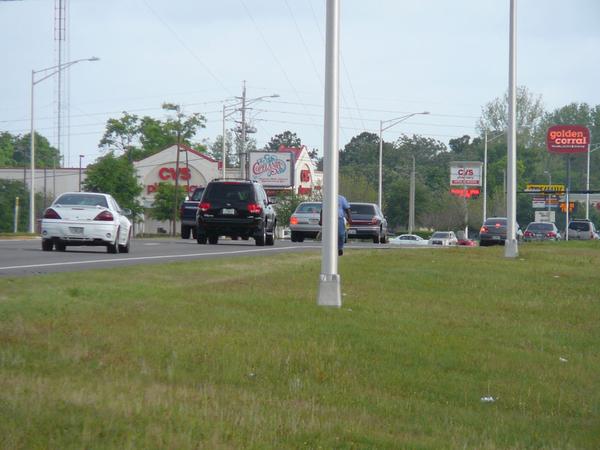Many communities across the country realize that designing neighborhoods, subdivisions, business districts and shopping centers around the automobile has diminished instead of enhancing quality of life. Adopting Context Sensitive Streets policies is a method to restore community livability that the City Council may consider implementing in Jacksonville.

What Are Context Sensitive Streets?
A context sensitive commercial corridor in Chicago's Roscoe Village.
Context Sensitive Street Design (CSSD) is an approach to roadway planning, design and street operation, to meet regional transportation goals while enhancing neighborhoods and considering the adjacent uses of land. CSSD respects traditional street design objectives for safety, efficiency, capacity, and maintenance, while integrating community objectives and values relating to compatibility, livability, sense of place, urban design, cost and environmental impacts.
Why Jacksonville
Despite being fully developed, many local highways like Southside Boulevard (above) still fail to include features taken for granted in many cities, such as sidewalks.
Our community's streets and highways are nationally known as being death traps for pedestrians and bicyclists. In addition, our mass transit operations are rudimentary and unreliable at best. In general, the concept of Context Sensitive Streets can be classified as making it a priority to bring "safe streets" to Jacksonville. Safe streets not only will reduce our death rates but they are also a quality of life enhancement tool that stimulates positive economic growth.
The Goals of Context Sensitive Streets
Charlotte's South Boulevard is an example of a context sensitive street that is designed equally for several mobility options.
Aligning with the guiding principles, goals and objectives expressed in the City of Jacksonville 2030 Comprehensive Plan, Visioning Plans, 2030 Mobility Plan, North Florida TPO 2035 Long Range Transportation Plan and Horizon 2030 Recommendations, the goals for CSSD in Jacksonville include:
1. Providing a variety of transportation choices
2. Improve connectivity of existing transit
3. Create walkable and connected neighborhoods
4. Improve mobility while advancing neighborhood character
5. Provide a safe and healthy environment
6. Create signature streets
7. Provide for economic growth
Benefits of Context Sensitive Streets
Benefits: Older Americans
- 21% over 65 do not drive
- Over 50% of non-drivers stay at home on a given day because they lack travel options
- 54% of older Americans living in inhospitable neighborhoods say they'd walk and ride more often if things improved.
Benefits: Health
- Now Americans move without moving (move while sitting down in automobiles)
- 60% are at risk for diseases associated with inactivity: Obesity, Diabetes, High blood pressure, Other chronic diseases
Benefits: Physical Activity
- Residents more likely to walk in a neighborhood with sidewalks
- Cities with more bike lanes have higher levels of bicycling
- 1/3 of regular transit users meet minimum daily physical activity requirement during their commute
Benefits: Safety
- Intersections designed for pedestrians can reduce pedestrian risk by 28%
- Sidewalks reduce pedestrian crash risk by 88%
Benefits: People With Disabilities
- Improved mobility for disabled people and reduced need for expensive paratransit service
Benefits: Better Use Of Transit Funds
- A year of paratransit service for a daily commuter: $38,500
- Making a transit stop accessible: $7,000-$58,000
Benefits: The Environment
- Fewer emissions
- Less noise pollution
- Less wear & tear on our roads
- Less need to widen roads
Benefits: Less need to widen roads
Trips in metro areas:
- 50% of vehicle trips in American metropolitan areas are less than 3 miles
- 28% of vehicle trips in American metropolitan areas are less than 1 mile
- 65% of trips under 1 mile in American metropolitan areas are now taken by car
Benefits: The Economy & Your Wallet
Multimodal streets:
- Increase Home Values
- Revitalize Retail
- People can leave their car at home
Source: Michael Ronkin, National Bicycle and Pedestrian Expert
http://www.michaelronkin.com/
To Learn More: City Council Context Sensitive Streets Special Committee
Recent context sensitive street improvements along Kings Road, near Edward Waters College.
City Council Context Sensitive Streets Special Committee
When: September 12, 2012
Time: 4:00 p.m.
Where: Jacksonville City Hall, 117 W. Duval St., 1st Floor Council Chamber
Notice is hereby given that the Honorable Lori Boyer, Chair of the Special Committee on Context Sensitive Streets, will meet with members of the Special Committee on Wednesday, September 12, 2012 at 4:00 P.M. in the Council Chamber, 1st Floor of City Hall, 117 W. Duval St, Jacksonville, Florida.
Purpose: Review the existing Context Sensitive Streets Guidelines that have been drafted by the Planning Department but not implemented, determine the appropriateness of these guidelines, investigate any other information pertinent to this issue, and make recommendations for and/or draft legislation as appropriate to address this issue.
Article by Ennis Davis


7 Comments so far
Jump into the conversation